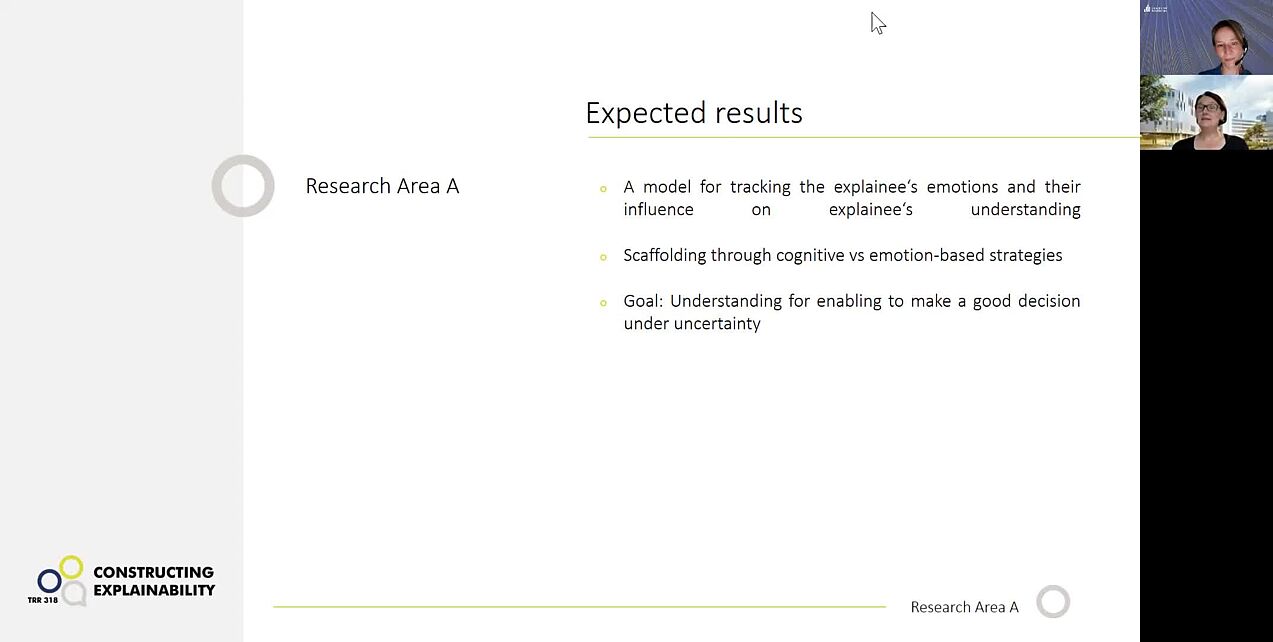Project A03: Co-constructing explanations between AI-explainer and human explainee under arousal or nonarousal

In Project A03, researchers are integrating the element of emotion into the explanation process by considering issues such as how emotional reactions influence the perception of an Artificial Intelligence explanation. Which decisions should humans make with the help of Artificial Intelligence in risky situations? How can explanations be aligned with the emotional state of the human user? Researchers from the fields of computer science and economics are investigating how emotions such as happiness and anxiety impact processes of comprehension and decision-making. Their goal is to develop a model for intelligent machines that recognizes emotions and takes these into account in explanatory processes.
Research areas: Computer science, Economics
Associate Member
Dr.-Ing. Birte Richter, Bielefeld University
Support Staff
Eileen Behrens, Bielefeld University
Former Members
Dr. Olesja Lammert, Research associate
Christian Schütze, Research associate
Publications
Incremental communication
B. Wrede, H. Buschmeier, K.J. Rohlfing, M. Booshehri, A. Grimminger, in: K.J. Rohlfing, K. Främling, S. Alpsancar, K. Thommes, B.Y. Lim (Eds.), Social Explainable AI, Springer, n.d.
Are numerical or verbal explanations of AI the key to appropriate user reliance and error detection?
J. Papenkordt, A.-C. Ngonga Ngomo, K. Thommes, Behaviour & Information Technology (2025) 1–22.
Can AI Regulate Your Emotions? An Empirical Investigation of the Influence of AI Explanations and Emotion Regulation on Human Decision-Making Factors
O. Lammert, in: Communications in Computer and Information Science, Springer Nature Switzerland, Cham, 2025.
Forms of Understanding for XAI-Explanations
H. Buschmeier, H.M. Buhl, F. Kern, A. Grimminger, H. Beierling, J.B. Fisher, A. Groß, I. Horwath, N. Klowait, S.T. Lazarov, M. Lenke, V. Lohmer, K. Rohlfing, I. Scharlau, A. Singh, L. Terfloth, A.-L. Vollmer, Y. Wang, A. Wilmes, B. Wrede, Cognitive Systems Research 94 (2025).
Humans in XAI: Increased Reliance in Decision-Making Under Uncertainty by Using Explanation Strategies
O. Lammert, B. Richter, C. Schütze, K. Thommes, B. Wrede, Frontiers in Behavioral Economics (2024).
Human Emotions in AI Explanations
K. Thommes, O. Lammert, C. Schütze, B. Richter, B. Wrede, in: Communications in Computer and Information Science, Springer Nature Switzerland, Cham, 2024.
Static Socio-demographic and Individual Factors for Generating Explanations in XAI: Can they serve as a prior in DSS for adaptation of explanation strategies?
C. Schütze, B. Richter, O. Lammert, K. Thommes, B. Wrede, in: HAI ’24: Proceedings of the 12th International Conference on Human-Agent Interaction, ACM, 2024, pp. 141–149.
Human Emotions in AI Explanations
K. Thommes, O. Lammert, C. Schütze, B. Richter, B. Wrede, in: 2024.
Towards a Computational Architecture for Co-Constructive Explainable Systems
H. Buschmeier, P. Cimiano, S. Kopp, J. Kornowicz, O. Lammert, M. Matarese, D. Mindlin, A.S. Robrecht, A.-L. Vollmer, P. Wagner, B. Wrede, M. Booshehri, in: Proceedings of the 2024 Workshop on Explainability Engineering, ACM, 2024, pp. 20–25.
The Role of Response Time for Algorithm Aversion in Fast and Slow Thinking Tasks
A. Lebedeva, J. Kornowicz, O. Lammert, J. Papenkordt, in: Artificial Intelligence in HCI, 2023.
RISE: an open-source architecture for interdisciplinary and reproducible human–robot interaction research
A. Groß, C. Schütze, M. Brandt, B. Wrede, B. Richter, Frontiers in Robotics and AI 10 (2023).
EEG Correlates of Distractions and Hesitations in Human–Robot Interaction: A LabLinking Pilot Study
B. Richter, F. Putze, G. Ivucic, M. Brandt, C. Schütze, R. Reisenhofer, B. Wrede, T. Schultz, Multimodal Technologies and Interaction 7 (2023).
Emotional Debiasing Explanations for Decisions in HCI
C. Schütze, O. Lammert, B. Richter, K. Thommes, B. Wrede, in: Artificial Intelligence in HCI, 2023.
What is Missing in XAI So Far?
U. Schmid, B. Wrede, KI - Künstliche Intelligenz 36 (2022) 303–315.
Which “motionese” parameters change with children's age? Disentangling attention-getting from action-structuring modifications
K. Rohlfing, A.-L. Vollmer, J. Fritsch, B. Wrede, Frontiers in Communication 7 (2022).
An Architecture Supporting Configurable Autonomous Multimodal Joint-Attention-Therapy for Various Robotic Systems
A. Groß, C. Schütze, B. Wrede, B. Richter, in: INTERNATIONAL CONFERENCE ON MULTIMODAL INTERACTION, ACM, 2022, pp. 154–159.
Enabling Non-Technical Domain Experts to Create Robot-Assisted Therapeutic Scenarios via Visual Programming
C. Schütze, A. Groß, B. Wrede, B. Richter, in: INTERNATIONAL CONFERENCE ON MULTIMODAL INTERACTION, ACM, 2022, pp. 166–170.
Show all publications




